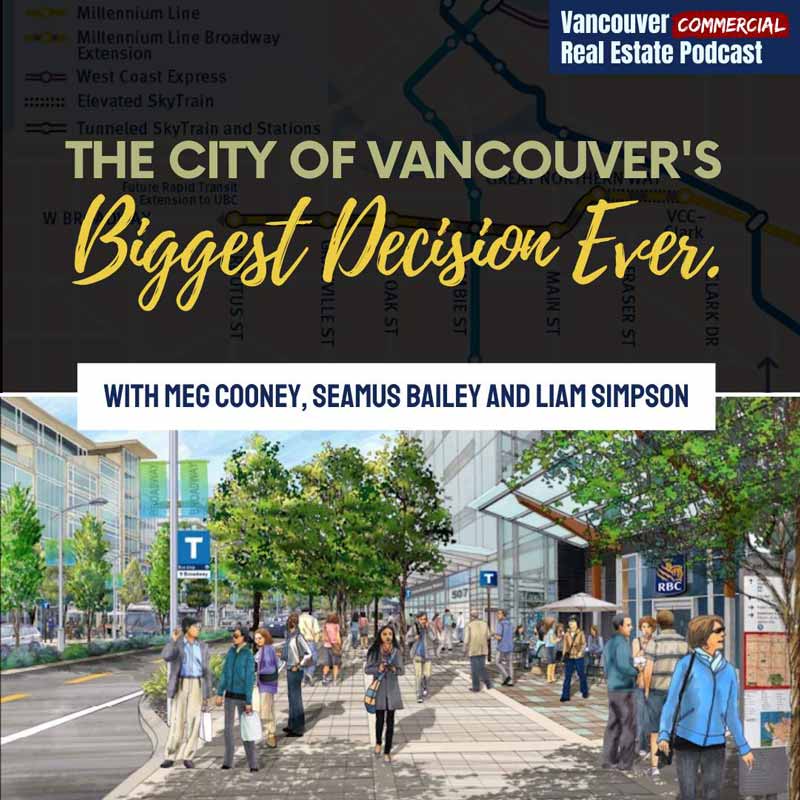
Powered by RedCircle
With the new Broadway Skytrain line in full swing, Vancouver's office market has started to rebound and the housing crisis continues to mount. The city's council members now have to vote on what could be the biggest vote in Vancouver's history.
This week, Cory and Matt welcome Meg Cooney, Seamus Bailey, and Liam Simpson from William Wright Commercial's Vancouver office to discuss the highlights and the lowlights of the proposed Broadway plan.
The team touches on areas that could have been more thought out with additional density, and they also discuss the strong attributes the plan will bring to some parts of the Broadway corridor. Almost 11% of the total land in Vancouver will be affected by this vote, so this is another episode you don't want to miss out on.
Who is Meg Cooney?
I’ve been in real estate for 10 years. I started in presale and transitioned to commercial real estate in 2015. My focus is on investment and land acquisition.
Who is Seamus Bailey?
I’ve been with William Wright for the last three years, focusing on land and investment with Meg and Liam. My background is in economics, so I do a lot of the underwriting.
Who is Liam Simpson?
I bounced around through a lot of asset classes but landed in investment and land a few years ago. It’s a really exciting place to be.
What is the Broadway Plan?
The Broadway Plan was initiated in 2018 with the goal to increase environmentally sustainable buildings, tackle housing issues and increase sustainable transportation. The scope spans from 1st to 16th and Vine to Clark, covering about 2100 acres.
This plan started when the Broadway subway extension began in 2014. In 2018, the plan started to come to life, but it’s been a long time coming.
One in twelve jobs in Western Canada are along the Broadway Corridor. What does the Broadway Plan offer from a commercial real estate standpoint?
The Broadway Plan is looking to create an additional 42,000 jobs, which is 50% more than they currently have. It’s definitely the largest plan taken on by Vancouver, and likely BC.
The city has identified the lack of office space along the Broadway Corridor. They don’t have the dense towers that we see downtown. So they’ve outlined plans for some denser towers, 30-40 storeys, around the subway stations. We anticipate a lot of demand for those areas.
The city is targeting the six station areas. That’s where we’ll see the most significant density and office opportunities.
One controversial aspect of the Broadway Plan is the lack of density in housing. What are you seeing?
We’re very active in this area and working with developers. Prior to the Broadway Plan being approved, people were concerned that there wasn’t enough space to build market strata for residential. Not all developers are set up to build market rental. So some developers are completely avoiding this area because it’s disincentivizing to build market rental.
Developers have to pay a rezoning price in the form of DCEs. In order to do that, they have to push the purchase price or take a loss. So while the city wants to see more rentals, it doesn’t always make sense for the developers.
What’s a DCE?
A DCE is a Development Contribution Expectation. This is a revenue generator for the city that goes towards infrastructure and amenities. The city is requiring heavily on this funding for the changes needed for the Broadway Plan.
The DCE is paid by the developer, but affects how much they can afford to purchase the land for. The only factor they can control is their revenue, which forces them to increase sales prices. Not knowing if the market is going to be receptive to that is a huge risk for developers.
The Broadway Plan disincentivizes strata and pushes developers towards purpose-built rental. In addition to the cost, some areas are not open for strata properties.
Does the Broadway Plan displace current renters?
There are two policy frameworks being put forward to handle existing tenants in the area under the Broadway Plan. Developers will have to either pay tenants to displace them or include them in their new developments at or below what they’re currently paying. So that makes it harder for developers to find value in projects.
These policies are also affecting current tenants who don’t believe the policies will be followed through with. So it’s causing strain on both sides.
Will the Broadway Plan create a building boom or is development too onerous to take on?
A lot of the larger scale projects under the Broadway Plan will probably be put on hold until a viable solution is found on the development side. When the first draft of the plan was released, there was a lot of excitement. But after a lot of revisions and controversy, the hype has died down.
Developers need to work their numbers too. They can’t commit to a project that will take 4-6 years and risk losing their shirt over it. There’s also the issue of timing; you have to get three owners in a row to all agree to sell at the same time. So while there’s been a lot of hype, I think it will take time to see the new development.
We’ve heard that there may be presale rental projects where big institutions and REITs will pre-buy large rental projects. That allows developers to have a bit more flexibility like they would with strata projects where they can presell homes. Whether that comes to fruition or not is hard to say, but it would be interesting.
How will the Broadway Plan change in real time?
The Broadway Plan is very large. And while it’s specific, it might not cover everything that will happen in the area.
There are three guiding principles in the plan. And the plan acknowledges that if a developer comes with a proposal that includes those principles, but doesn’t completely meet the scope, it may be considered. If I was a developer, I would sit back and see how much the city allows developers to come with their own ideas.
This plan is the city’s vision. But not all plans come to fruition in the same way or same timeline as the city wants.
Are developers hesitant to get too excited about building under the Broadway Plan given current economics?
We’ve definitely seen some slowdown and caution, especially in situations where a developer would be pioneering in the Broadway Corridor. So some may sit on the sidelines and see what precedents are approved. With rising interest rates, inflation, supply chain issues and other uncertainty in the market, it may make sense to wait.
Rising construction costs are affecting everyone. The Broadway area will be particularly expesnve with higher quality product and more amenities. So with the high DCE, that further disincentivizes building in the Broadway Corridor.
In 2016/2017, there was a boom around the Broadway Plan, but that was largely speculative. For developers who bought then, they may have gotten a discount and their projects could pencil out now. So we should see some development activity. But I don’t think new acquisitions will be as rampant.
What projects along the Broadway Corridor are you most excited about?
The most exciting new project is at Broadway and Granville by PCI. They bought the site years ago. It will be a 39-storey tower with mainly rental housing, including some low-income rental options. There will also be office space and retail space, including a grocery store.
However, PCI didn’t have an easy time of it. Many naysayers said the building was too tall and would ruin the community feel. But it’s nice that we have one large-scale project underway to set the precedent for the area.
Is the city overplaying their hand with the Broadway Plan?
I would say the City of Vancouver is underplaying their hand with the Broadway Plan. It seems they have paid more attention to the optics of the plan rather than the incentives.
We are in a housing crisis and we desperately need more rental. But unless the city undertakes the majority of rental projects themselves, they have to make the underwriting work for a developer.
The commercial aspects of the Broadway Plan are very exciting. Many developers are very interested in the office aspect in particular. So while the city missed the mark on rentals, I think we will see some building on the office side. With office, developers can build rental or strata, so there is more flexibility.
This plan is what the city wants to say. But tenants feel like they will be pushed out and don’t have a guarantee. And small to medium developers feel it’s too expensive to take the risk. Larger developers may take a pay cut in order to get their name on Broadway.
But it’s not all doom and gloom. If the Broadway Plan does come to fruition, it’s going to be a very beautiful part of the city.
Are there any opportunities in the Broadway Plan for mom and pop investors?
There is still an opportunity for smaller investors to look into multi-family buildings along the Broadway Corridor. They’re a stable investment with cash flow in place. You will also have opportunity as the Broadway Plan progresses and changes. I don’t think there will be a development flip, but someone willing to hold and enjoy the stability and cash flow can find an opportunity.
On the commercial side, we have to look at how the Broadway Plan will impact neighbouring communities. Many more people will be coming to Broadway. So there might be opportunities for strata ownership in other nearby communities as this plan develops.
Another opportunity would be to purchase an existing strata office or retail property on Broadway. We think lease rates will be increasing as the area changes and the subway comes in. If you’re looking to invest in the area, it’s a good time to purchase.
There are a lot of aging stratas that fall within the Broadway Plan. There will be opportunities to lease those out and you may also benefit from a future strata wind up. That could offer a nice lift for investors. Many of these stratas know this is the opportunity coming up.
Find out more:
williamwright.ca
[email protected]
[email protected]
[email protected]
For all the curious minds interested in commercial real estate investing, grab a coffee and pull up a chair because we have exclusive stories and tips from commercial real estate brokers, investors, developers, economists, urban planners, and everyone in-between. From the successes and failures to the motivations and lessons learned, the Vancouver Commercial Real Estate Podcast is your insight into commercial real estate in Vancouver, Victoria, Kelowna, and beyond.
What's the best real estate market to invest in? What are the commercial real estate asset classes and property types? Hosted by Cory Wright, founder of William Wright Commercial, and co-hosts Adam and Matt Scalena of the Vancouver Real Estate Podcast, our podcast opens the door to real estate investing for everyone from beginner investors to experienced real estate professionals. New episodes are released every Tuesday. Follow the Vancouver Commercial Real Estate Podcast on Apple Podcasts, Spotify, Google Podcasts, or your favourite streaming platforms.

This communication is not intended to cause or induce breach of an existing agency agreement. E&OE: All information contained herein is from sources deemed reliable, and have no reason to doubt its accuracy; however, no guarantee or responsibility is assumed thereof, and it shall not form any part of future contracts. Properties are submitted subject to errors and omissions and all information should be carefully verified. All measurements quoted herein are approximate.
ⓒ William Wright Commercial Real Estate Services 2024
Proudly designed by Burst Creative